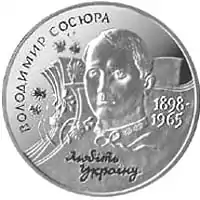Volodymyr Sosiura
Volodymyr Mikolayovich Sosiura (Ukrainian: Володимир Сосюра; born January 6, 1898 in Debaltseve, Yekaterinoslav Governorate (today Donbas region) of the Russian Empire - died January 8, 1965 in Kyiv, Ukrainian SSR of the Soviet Union) was a Ukrainian lyric poet, writer, veteran of the Russian Civil War (1918-1920).
Volodymyr Sosiura Володимир Сосюра | |
|---|---|
 Volodymyr Sosiura | |
| Born | Volodymyr Sosiura January 6, 1898 Debaltseve, Yekaterinoslav Governorate, Russian Empire (Donbas) |
| Died | January 8, 1965 (aged 67) Kyiv, Ukrainian SSR, Soviet Union |
| Occupation | poet, veteran |
| Nationality | Ukrainian |
| Literary movement | CPU(b), Ukrainian Proletarian Writers, VAPLITE etc |
| Notable works | Love Ukraine (Любіть Україну), To Maria, Stalin etc |
| Notable awards | Stalin Prize (1948), Shevchenko Prize (1963) |
| Spouse | Maria |
Brief biography
Volodymyr Sosiura was born in a settlement of Debaltseve train station (today city of Debaltseve).[1]
He started to work in 1909 at the Donets Soda Factory in a settlement Verkhnee (today part of Lysychansk) where he worked for couple of years.[1] In 1914–1918 he studied in an agricultural school (uchilische) in a settlement of Yama train station (today Siversk).[1] In 1918 Sosiura was a member of the Donets Soda Factory insurgent workers group.[1]
Sosiura fought in Petliura's Ukrainian People's Army (the 3rd Haidamaka Regiment that was quartered in Bakhmut)[2] during the winter of 1918 to the autumn of 1919, before being taken prisoner by Denikin's Volunteer Army. He was sentenced to death, but managed to escape. Later, after the UPR was overrun, he joined the Red Army.
After the Russian Civil War in Ukraine ended (see Ukraine after Russian Revolution), he studied at the Artem Communist University in Kharkiv from 1922–23, then at the workers' faculty of the Public Education Institute (Kharkiv) from 1923-25. Sosiura belonged to the Ukrainian literary organizations Pluh, Hart, VAPLITE, and the All-Ukrainian Association of Proletarian Writers.
In the 1920s-30s Sosiura became very popular, but his ideological loyalties were torn between patriotic feelings for Ukraine and those for the Soviet Union and its often-changing ideologies. Even though he had long been a member of the CPU(b), he was frequently in conflict with it, and was twice expelled for "nationalistic undertones," he was even forced to undergo a "reeducation" at a factory in 1930-1931. Many of Sosiura's poems were not published.
In 1948 he was awarded the highest honors of the Stalin Prize, but then he came under harsh criticism for his poem entitled Love Ukraine (Любіть Україну), which was deemed too nationalistic in its tone by several Soviet news-media including Pravda. Afterwards his wife was arrested and spent six years in NKVD prisons. In 1963, he won the Shevchenko Prize for Swallows on the sun and Happiness of a working family.
Sosiura died in Kiev at the age of 66.
Works
His works include numerous poems that vary from the patriotic genre to love poems such as Love Ukraine, The Late Summer (Babyne Lito), To Maria, Stalin, and many others.
For further reading refer here
Legacy
His portrait and title of his poem, Love Ukraine, are featured on a two Hryvnia collectible coin.

References
- Halchenko, Serhiy Anastasiyovych. (СОСЮРА ВОЛОДИМИР МИКОЛАЙОВИЧ). Encyclopedia of History of Ukraine.
- Tynchenko, Ya. Bakhmut Cossacks. Who are they? (Бахмутські козаки. Хто вони?). The Ukrainian Week. 14 May 2016
External links
| Wikimedia Commons has media related to Volodymyr Sosiura. |
- Poetry of Volodymyr Sosiura
- Asher, Oksana (1959). A Ukrainian Poet in the Soviet Union. Svoboda. p. 19.
- Volodymyr Sosiura at Encyclopedia of Ukraine
- Volodymyr Sosiura and the Oppressors of National Spirit By Ihor Siundiukov, The Day
- Live reading during the Independence Day on YouTube (in Ukrainian)
- Love Ukraine on YouTube. Read by Basil Bucolic (YouTube)